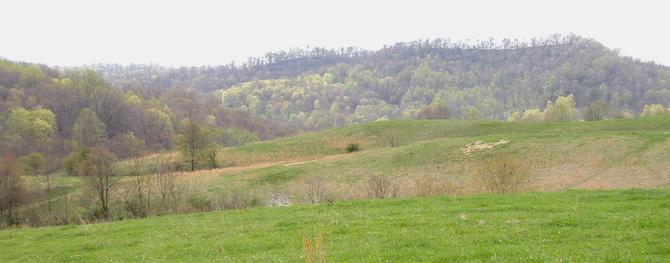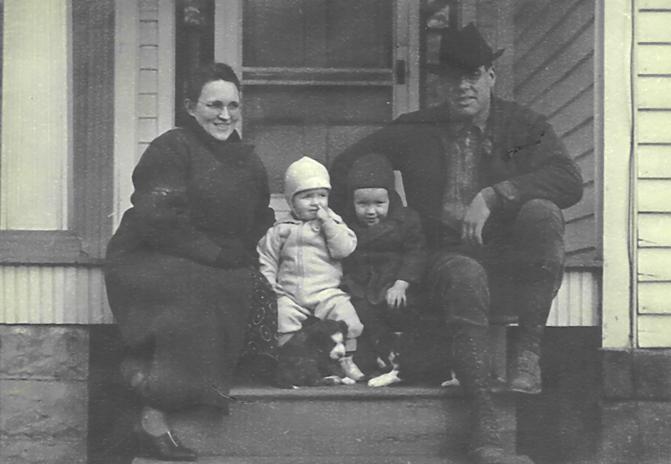
| Next Chapter | Previous Chapter | |
| Chapter 2: Earliest Memories: 1. Sheep | Contents | Acknowledgments |
Farming as I have known it: 60 years in Central Appalachia.
By S. T. Bond
This is a book about some of the main concerns of life on a farm in West Virginia in the years 1940 to 2002, and family recollections of times previous. The stories come from memories stored in my mind and the memories of my friends. I can't say the life we lived is entirely typical, but who lives a completely typical life? It is a good sample, though a little richer perhaps, than a typical cross section of the times.
(Illustration 1-1)

West Virginia meadow in Spring - Hunter Kolb Farm
The main thread of the book is about how the technology of farming changed in these years, and about social relations, particularly before 1960, which approximately marks the end of the old era. The stories are told from a personal viewpoint, or that of my family. Some local events are mentioned which were controlled by the federal government (the Interstate, Stonewall Jackson Dam, watershed projects, Ag programs, etc). Also mentioned are some events controlled by corporate interests, such as the gas company's storage field, strip mines, and certain other companies that increasingly provide employment to our rural people. As a result of this employment, most folks living in the country now are "rural, nonfarm" as the U. S. census put it. They plant gardens and flowers, may keep a horse or two, but they do it for "life style" rather than for income. We have very few "full time farmers" here now. I have operated on a fairly large scale for Appalachia, but also taught college and high school until retirement. My wife Esther also taught. I consider both teaching and farming as occupations, one to live on and the other to provide financial growth.
There is a little bit in the book about the changes in the biological environment, which have been profound, and mostly for the better, in this area. The groundhog, snakes and rats get their due, and I mourn the passing of chestnut trees and apple orchards, ubiquitous at the time of World War One. The virtue of self-motivated heavy labor in youth is discussed, as is the value of a fairly strict child rearing with communal standards and communal participation. What it took to become a farmer, and how a farmer got educated in my time is considered. Farming is dangerous, and several memorable accidents are recounted. The strip mining industry and the oil and gas industry, almost the only rural industries other than farming, and their influence are discussed at some length.
My knowledge of chemistry and other science has given some unusual insights, some of which I share, notably, one in connection with spraying for brush control, and another an incident involving a local industry, never before seen in print. The food we ate, and the clothes we wore, changed with time. Concerned Land and Natural Resources Owners, Incorporated, is considered because it shows well the problems farmers have when others want the resources they own. Farming landowners in the United States generally have low social and economic status, in contrast to their status in other parts of the world, and are relatively weak compared to those with whom they must spar. There are stories about other farmers, and some of the colorful language of the era.
(Illustration 1-2)

Mother, Sister Lou, myself, Dad, on the steps of the Kennedy Grandparents. About 1936, before sister Ann came along.
My view is extended backwards somewhat by family stories. Lost Creek is the location of the church we belonged to and has been sort of a family center, dating back to the ancestors who came to Western Virginia from Eastern Maryland in 1799, right after the Revolutionary War. Unfortunately, this extension of memory only reaches back to my Great grandfather, Booth Bond, and his wife Rebecca Van Horn. The frontier experience was largely lost by my childhood.
Unavoidably, there is a great deal of nostalgia and sentimentality in the book. I am an old man looking back over a long life filled with pleasure and pain. I see changes coming in the world that I would not choose for myself or anyone I like, and I know that the only way to nail down the true nature of the past is to record it at or near the time it happens. Every generation reinterprets the past in terms of itself. My academic life taught me there are plenty of people eager to rewrite history for pay. Most people in my time and place have been reasonably happy, even though poor, because they are free to work toward happiness. Self-discipline was, and always will be, necessary, because the possibilities in this world are structured, and creativity and planning are the way to achieve any goal. The self-indulgence of the very weak and the very strong belongs in another world than the one I write about here.
| Next Chapter | Previous Chapter | |
| Chapter 2: Earliest Memories: 1. Sheep | Contents | Acknowledgments |
Copyright © 1998, 2006, 2008, 2011 S. Tom Bond (stombond at hughes.net)